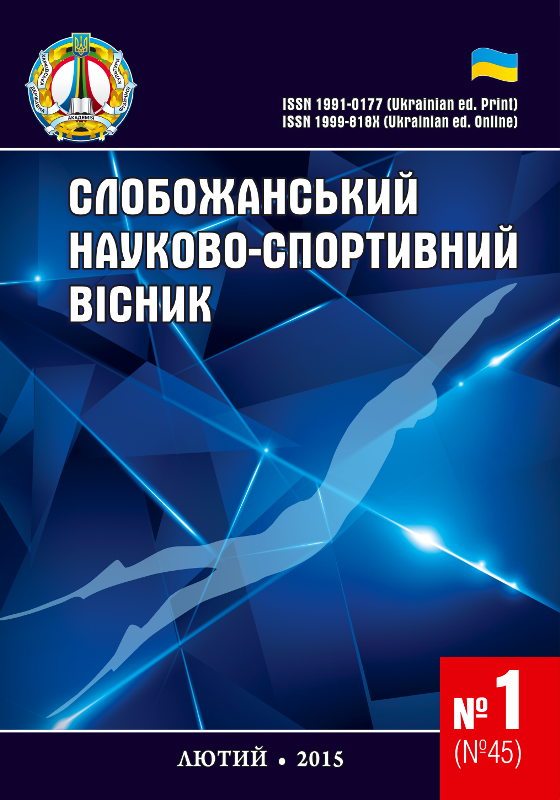The assessment of some parameters of physical health of primary school pupils
DOI:
https://doi.org/10.15391/snsv.2015-1.017Keywords:
pupils, primary school, level of physical healthAbstract
Purpose: to determine the level of somatic health and adaptive-reserve capabilities of organism of primary school pupils. Material and Methods: physical health level was determined by the means of H. L. Apanasenko method. The methodology developed by S. V. Hosak and O. T. Elizarova was used for estimation the level of pupils’ adaptation to environment. The study involved 55 pupils 6–7 years (27 boys and 28 girls) enrolled in 1-A and 1-B forms of comprehensive school № 7, Shostka, Sumy region. Results: it was determined that characteristics of physical health of most pupils of primary school conform to levels from low to medium, and most pupils have medium level of adaptive capabilities. Conclusions: there is an urgent necessity in organization and conduct of purposeful sports and preventive measures that contribute to improving health and adaptive-reserve capabilities of the organism in junior schoolReferences
Apanasenko H. L., Popova L. A., Mahlovanyi A. V. Sanolohiia (medychni aspekty valeolohii): pidruchnyk dlia likariv-slukhachiv zakladiv (fakultetiv) pisliadyplomnoi osvity [Sinology (medical aspects of valeology): a textbook for medical students of the institutions (faculties) of postgraduate education], Lviv, PE "Quart", 2011, 303 p. (ukr)
Hozak S. V., Yelizarova O. T. Hihiiena naselenykh mists [Hygiene of populated areas], 2012, vol. 59, pp. 285 – 293. (ukr)
Kapitan T. V. Propedevtyka dytiachykh khvorob z dohliadom za ditmy: pidruchnyk dlia studentiv vyshchykh medychnykh navchalnykh zakladiv [Propaedeutics of children's diseases with child care: a textbook for students of higher medical educational institutions], Vinnytsia, DP DKF, 2006, 792 p. (ukr)
T. Yu. Krutsevych, M. I. Vorbiov, H. V. Bezverkhnia. Kontrol u fizychnomu vykhovanni ditei, pidlitkiv ta molodi : navch. posib. [Control in physical education of children, adolescents and youth: textbook], Kyiv, Olimp. lit., 2011, 224 p. (ukr)
Mykhno L. S. Sportyvnyi visnyk Prydniprovia [Sports Bulletin of the Dnieper], 2014, vol. 2, pp. 102-107. (ukr)
Serhii Trachuk. Teoriia i metodyka fizychnoho vykhovannia i sportu [Theory and methods of physical education and sport], 2008, vol. 1, pp. 69-71. (ukr)
V. D. Chebotarova, V. H. Maidannyk. Propedevtychna pediatriia: pidruchnyk dlia studentiv vyshchykh medychnykh navchalnykh zakladiv [Propedeutics pediatrics: a textbook for students of higher medical educational institutions], Kyiv, 1999, 578 p. (ukr)
Neil Armstrong, Sulin Cheng, J. Larry Durstine. Physical activity, physical fitness, diet and the health in young people. Journal of Sport and Health Science, 2012, vol. 1, issue 3, pp. 129-130.
Catherine M. Capio, Cindy H. P. Sit, Kathlynne F. Eguia, Bruce Abernethy, Richard S.W. Masters Fundamental movement skills training to promote physical activity in children with and without disability: A pilot study. Journal of Sport and Health Science, 2014. Access mode: http://www.sciencedirect.com/science/article/pii/S2095254614000921
Ang Chen. Motor skills matter to physical activity – At least for children. Journal of Sport and Health Science, 2013, vol. 2, issue 1, pp. 58-59.
World Health Organization. Global recommendations on physical activity for health. Geneva, Switzerland: World Health Organization, 2010, 60p.
Downloads
Published
How to Cite
Issue
Section
License
Copyright (c) 2015 (Lyudmila Mykhno) Михно Людмила Сергіївна

This work is licensed under a Creative Commons Attribution 4.0 International License.
Our publications make use of copyright CREATIVE COMMONS open access journals.
Authors published in this journal agree to the following terms:
1 The authors reserve the right of authorship of the work and pass the journal right of first publication of this work are licensed under the Creative Commons Attribution License, which allows others to freely distribute the published work with reference to the authors of the original work and the first publication of this magazine.
2 The authors have the right to enter into separate agreements for additional non-exclusive distribution of work in the form in which it was published the magazine (such as work place electronic repository institution or publish as part of the monograph), provided that the reference to the first publication of this magazine.

 Attention, authors!
Attention, authors!


